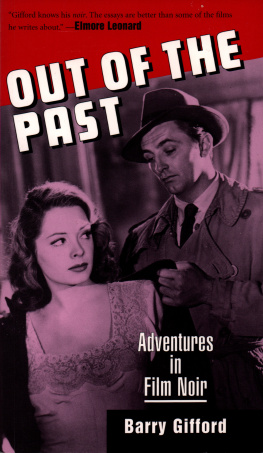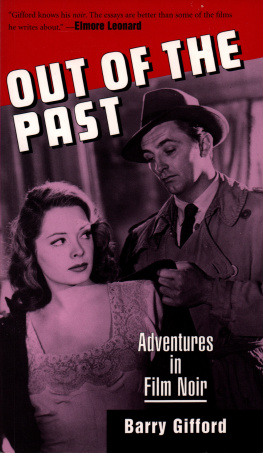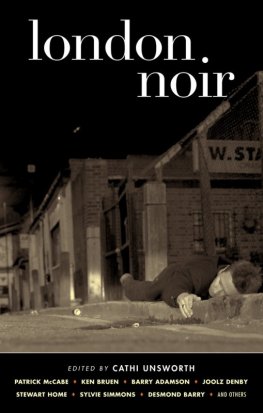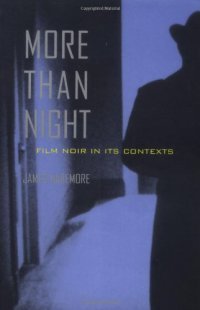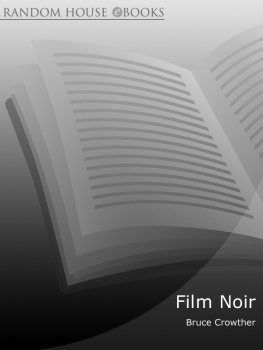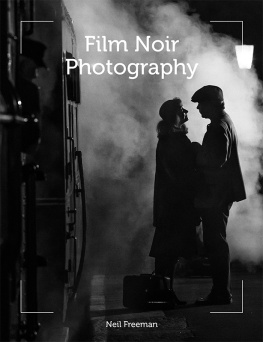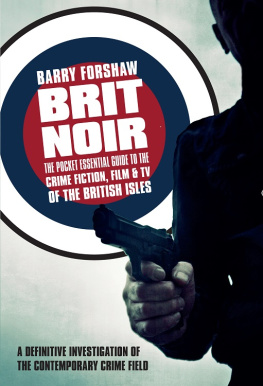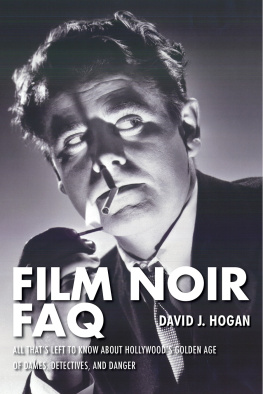Barry Gifford - Out of the Past: Adventures in Film Noir
Here you can read online Barry Gifford - Out of the Past: Adventures in Film Noir full text of the book (entire story) in english for free. Download pdf and epub, get meaning, cover and reviews about this ebook. year: 2000, publisher: University Press of Mississippi, genre: Detective and thriller. Description of the work, (preface) as well as reviews are available. Best literature library LitArk.com created for fans of good reading and offers a wide selection of genres:
Romance novel
Science fiction
Adventure
Detective
Science
History
Home and family
Prose
Art
Politics
Computer
Non-fiction
Religion
Business
Children
Humor
Choose a favorite category and find really read worthwhile books. Enjoy immersion in the world of imagination, feel the emotions of the characters or learn something new for yourself, make an fascinating discovery.
- Book:Out of the Past: Adventures in Film Noir
- Author:
- Publisher:University Press of Mississippi
- Genre:
- Year:2000
- Rating:5 / 5
- Favourites:Add to favourites
- Your mark:
- 100
- 1
- 2
- 3
- 4
- 5
Out of the Past: Adventures in Film Noir: summary, description and annotation
We offer to read an annotation, description, summary or preface (depends on what the author of the book "Out of the Past: Adventures in Film Noir" wrote himself). If you haven't found the necessary information about the book — write in the comments, we will try to find it.
Out of the Past: Adventures in Film Noir — read online for free the complete book (whole text) full work
Below is the text of the book, divided by pages. System saving the place of the last page read, allows you to conveniently read the book "Out of the Past: Adventures in Film Noir" online for free, without having to search again every time where you left off. Put a bookmark, and you can go to the page where you finished reading at any time.
Font size:
Interval:
Bookmark:
1959. Directed and written by Franois Truffaut. Starring Jean-Pierre Leaud, Patrick Auffray, Claire Maurier and Albert Remy.
When I was a boy my mother and I went to movies together often. She loved going to the movies, day or night, all kinds, but especially foreign films: French, British, even Hungarian; movies she couldnt get other adults to see with her, so she took me.
I saw The 400 Blows with my mother in 1959, when I was twelve years old, the same age as the films protagonist, played by Jean-Pierre Leaud. Apparently largely autobiographical, The 400 Blows is about a semidelinquent kid who lives in a rundown walkup apartment in Paris with his mother and father. The father is a rather ineffectual, nondescript type, who works a boring nine-to-five job and isnt around much. The mother is a kind of sexy, frustrated blonde who figures the world owes her a better deal. She cheats on her husband, and one afternoon, when the boy is playing hooky, he spots his mother in the street kissing a man. The boy and his mother lock eyes but dont speak, and later she makes a deal with him: she wont say anything about his cutting school if he keeps quiet about what he saw. This disgusts the kid, but what can he do?
There is one scene in the movie that affected me more than any other. The boy and his parents are returning home from a rare family outing, probably on Sunday evening, and as the mother is hanging up her coat in the hallway, her husband reaches up from behind and squeezes her breasts. I remember thinking when I saw this that my mother was a pretty good sport to be taking me to a movie that had stuff like that in it. But I also saw the uncomfortable look on the womans face when it happened. She didnt like her husband touching her any longer in that intimate way; she was annoyed but tried not to show it, to disguise her unhappiness and disappointment with her marriage, her life. The woman no longer loved her husband, but he loved her, and it was a pathetic moment. I was overwhelmed by an unexpected sadness, a deeply painful feeling for which I was unprepared.
I suppose I identified to a certain extent with the boy, and I saw something of my own mother in the woman on the screen, but somehow that one pathetic gesture on the part of the unloved, betrayed husband provided me a window on the lie, and revealed the undeniable tragedy inherent in the life yet to come.
Barry Gifford was born in 1946 in Chicago, Illinois, and was raised there and in Key West and Tampa, Florida. His novel Wild at Heart (made into an award-winning film by David Lynch) was the first in a succession of novels exploring a similar part of the American landscape that has brought him increasing acclaim. His books have been translated into twenty languages. One of them, Night People, was presented the Premio Brancati, Italys national book award established by Pier Paolo Pasolini and Alberto Moravia. Mr. Gifford is also the author of The Sinaloa Story, Port Tropique, Wyoming, Baby Cat-Face, My Last Martini, Perdita Durango, and The Wild Life of Sailor and Lula, among other works of fiction. Screenplays include Lost Highway (with David Lynch), Perdita Durango (with Alex de la Iglesia), and Hotel Room Trilogy. He has published numerous books of poetry, including Ghosts No Horse Can Carry (Collected Poems 19671987), Poems from Snail Hut, The Blood of the Parade, Persimmons: Poems for Paintings, Giottos Circle, Beautiful Phantoms, Coyote Tantras, and Flaubert at Key West. Works of nonfiction include Bordertown (with photographs by David Perry), A Day at the Races, Jacks Book: An Oral Biography of Jack Kerouac (with Lawrence Lee), and The Phantom Father: A Memoir. He lives in the San Francisco Bay Area.
(also known as The Big Carnival) 1951. Directed by Billy Wilder. Starring Kirk Douglas, Jan Sterling, Richard Benedict, Robert Arthur and Porter Hall.
The bronc bucked on the red Wyoming license plate as the battered purple pickup carrying two men in black cowboy hats lurched along the highway past the outskirts of Albuquerque. I followed close behind, wondering where in wide-open Wyoming they were from and what they were doing this far from home. An empty beer bottle rolled off the back of the open truck tailgate and crashed just ahead of my maroon 55 Buick Century, crunching under the right front tire.
I decided to try and pass the pickup and see what these two boys looked like. It was a two-lane, and after topping a rise I swung the Buick out to the left into the opposite lane and stabbed it. When I pulled even with the pickup cab I slowed a moment and stole a look. They were two old fellas, looked like they just tumbled in off the range, jagged sideburns, beards half-full, lean and wiry, in their late fifties, sixties-and-some, both grim-mouthed and eyes set to the sunset blue-red road in front of them. I moved the Buick past, taking a curve sharper than I should have, tires squealing, leaving the old boys behind.
I decided to stop for coffee at a caf west of town. I sat at the counter. There were two other customers in the place, an old man and an Indian kid, both of whom sat at the far end of the long side of the L-shaped counter eating chili out of dark blue enamel bowls. The old man did not look up while he ate. The Indian kid glanced over at him every few seconds to see that the old man was doing all right.
Then the angel appeared. I was sure she was an angel, an omen, a fawn-child no more than thirteen years old in a white waitress uniform, platinum hair tied tight to her head, clear blue eyes surrounded by an inky path of make-up, Lolita-like with skirt stopped top of the thigh and disdainful lip no doubt dealt with midnight truckers, small town wifely sneers, all men mad to unwrap and sup at the sweet sap purity tap. But there was so much coldness, hardness in her stare that I had to avert my eyes, blink blindly at the menu, then gaze again, unable to convince myself that this was no vision, no lie, but the pearl of New Mexico.
I couldnt help but follow her movements carefully, and didnt dare look away when she bent to retrieve a fallen utensil, revealing the underside of her thighs and flash of flame-pink cotton. I coughed and she brought me a glass of water. I ordered coffee and scrambled eggs and toast.
Outside again I spat out the window and drove on, leaving the angel of the desert caf to her Hollywood dreams, to age, to what I couldnt touch but what I could not help but be touched by.
1938. Directed by John Cromwell. Screenplay by John Howard Lawson with additional dialogue by James M. Cain. Starring Charles Boyer, Hedy Lamarr, Sigrid Gurie, Joseph Calleia, Alan Hale and Gene Lockhart.
This is a remake of Pepe le Moko, the French classic that starred Jean Gabin as a gangster sequestered in the Casbah, from which he controls a network of criminals. In English, its Charles Boyer as Pepe. The French police come to Algiers determined to apprehend Pepe, suggesting a house to house search, at which the Algerians scoff. Joseph Calleia plays the native cop who actually hangs out at Pepes and tells him hell get him one day. But Pepe is protected in the Casbah mazeanyone who means him harm would never get out of there alive.
Scripted by one of the Hollywood Ten with clean-up work by a master of American menace, Algierss premise is that Pepe is tired of life behind the walls, even though he has money, women and power. The French want him back for crimes hes committed there, and the Algiers police have no recourse but to wait him out. Sooner or later, Calleia knows, something will lure him from his stronghold. Of course, it turns out to be a woman, Miss Hedy Lamarr, straight from her Czechoslovakian
Font size:
Interval:
Bookmark:
Similar books «Out of the Past: Adventures in Film Noir»
Look at similar books to Out of the Past: Adventures in Film Noir. We have selected literature similar in name and meaning in the hope of providing readers with more options to find new, interesting, not yet read works.
Discussion, reviews of the book Out of the Past: Adventures in Film Noir and just readers' own opinions. Leave your comments, write what you think about the work, its meaning or the main characters. Specify what exactly you liked and what you didn't like, and why you think so.

